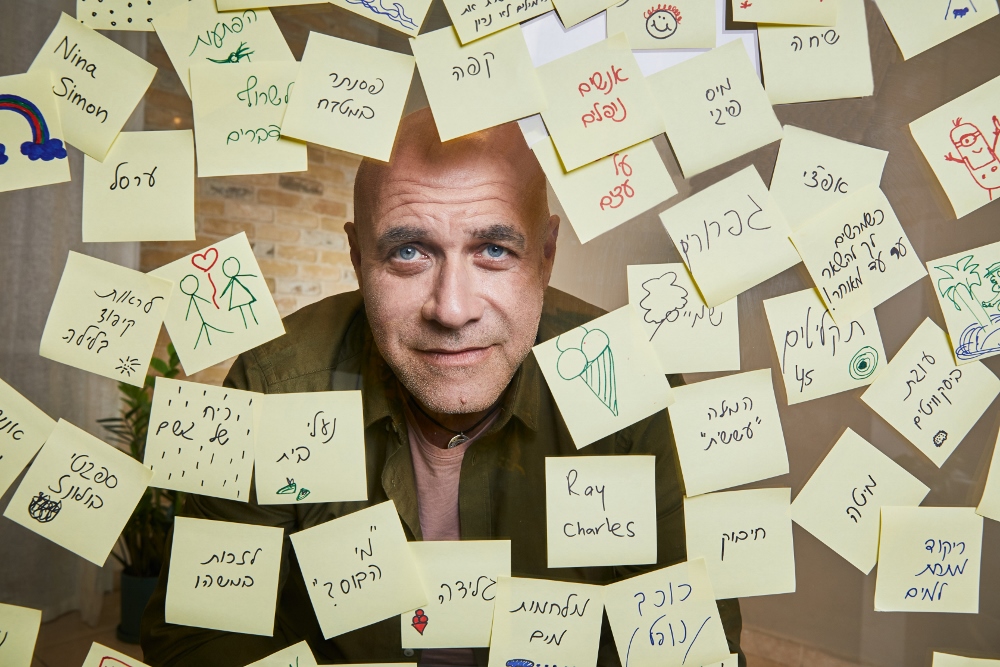
It’s astonishing that a play whose central themes are depression and suicide can provide a hilarious, entertaining evening, yet that is the experience of Duncan McMillan’s Every Brilliant Thing, directed by Shay Pitowski at the Cameri Theatre, and starring Dvir Bendek. It’s quite a feat, and Dvir Bendek accomplishes this balancing act with warmth and panache, as well as superb comic timing and ready wit.
The one-person play focuses on its narrator (Bendek), who remains unnamed, and addresses the audience directly, sharing his life story, beginning with his mother’s suicide attempt. It’s a harsh point of origin, yet it is made manageable for the audience through the creative coping method of the narrator, who was seven years old at the time. With the love and optimism of a young child, he decides to make his mother a list of all the “brilliant things” in life. Number one is ice cream.

Highly structured, McMillan’s one-person play relies on audience participation, and Eli Bijaoui’s translation, contemporary without resorting to slang, is wonderfully transparent; the conversation flows freely between actor and audience, as if the play had been originally written in Hebrew. The audience is seated on all four sides of the stage area, and the venue is fully lit throughout the play, so that everyone can be seen. Before starting, Bendek hands out notes to several people in the audience, each with a number and a word or phrase written on it. These are the narrator’s list of brilliant things, that range from the concrete to the ephemeral, and make their appearance throughout the evening. As the narrator recounts the significant events in his life, he also selects audience members to portray the characters that appear, such as his dad, or a school counselor. On the night I saw the play, all those chosen performed their part with grace, good humor, and feeling. Bendek is skilled at guiding the audience participants, and provides a sense of security – there are no wrong answers. Even if you make a mistake, he works with it, and all is well. This aspect of the play means that each performance will be a different experience, depending on the small nuances of improvisation that change with each new audience.
How does a child cope with a parent’s depression and suicide? What impact does this have on his development and sense of identity? McMillan’s play tries to be upbeat and it’s hard to do that while pursuing these issues in depth. There’s a risk that the lively, humorous tone will overpower the more serious aspects of the play. If Scylla is the danger of skimming over painful issues too lightly, then Charybdis is the risk of becoming a didactic public service announcement. It is a rare play that can do it all – entertain, educate, and evoke a deep emotional and intellectual response. In engaging the audience, and creating an evening in which laughter is the dominant affect, the creative team here makes it easier for the audience to open up to a consideration of these themes. I believe that it’s crucial for our culture to encourage an honest and open discourse on issues of mental health, and laughter is a wonderful way to open hearts and minds.
The list of “brilliant things” places an emphasis on the small moments in life, as does the play itself. The sense of a narrative arc is somewhat lacking, and it feels more like a sequence of vignettes, scenes from a life from which it is difficult to distill an over-arching message. This might disappoint some viewers. Perversely, I found this aspect of the play very meaningful. Coping with depression doesn’t necessarily mean that you never laugh or have good times and conversely, laughing, loving, and having good times does not mean that depression has utterly disappeared. The list of “brilliant things” does not provide a grand answer to resolve all existential despair, but it is attentive to the small moments of beauty, wonder, reflection, laughter, and joy. In his performance, Dvir Bendek creates a shared experience with the audience, a sense of community, however ephemeral, and that is a brilliant thing.
Every Brilliant Thing
By Duncan McMillan
Translated by Eli Bijaoui; Directed by Shay Pitowski; Performed by Dvir Bendek





